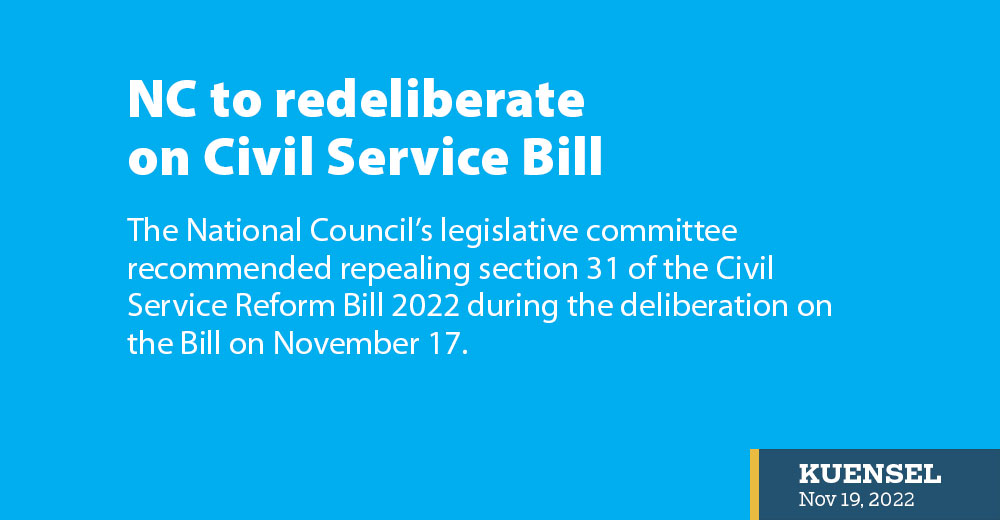Dechen Dolkar
The National Council’s legislative committee recommended repealing section 31 of the Civil Service Reform Bill 2022 during the deliberation on the Bill on November 17.
Tsirang MP and the chairperson of the Legislative Committee, Dhan Kumar Sunwar, presented the committee’s recommendation to the House.
The Civil Service Reform Bill 2022 section 31, states that the Office of the Attorney General (OAG) shall compound petty offences in accordance with the compounding rules.
The National Assembly amended that the OAG shall compound petty offences in accordance with the compounding rules endorsed by Lhengye Zhungtshog.
The Deputy Chairperson of the Committee, eminent member Ugyen Tshering said that section 31 is not related to the civil service reform initiative and is completely different.
He said that in future it could create many problems including the overhauling of the entire legal system in the country.
As an example, he said that in other countries there are many instances where the government interferes with the Attorney General’s prosecution of cases. “Though it has not happened in our country, it is difficult to say what type of government will come in future,” the eminent member said.
He said that in terms of accountability since 62 percent of the offences are compoundable offences and the accountability of the people will be lost.
The eminent member also said that only rich people would be able to pay the fine in lieu of imprisonment and only those who cannot pay would be undergoing imprisonment.
The Committee accepted the National Assembly’s amended section 11 stating that the Lhengye Zhungtshog may rename the ministries in consultation with the Royal Civil Service Commission.
However, the MP of Gasa, Dorji Khandu said that section 11 of the Bill contradicts the Constitution and the Bill.
Article 20, section 2 of the Constitution states that the Executive Power shall be vested in the Lhengye Zhungtshog which shall consist of the Ministers headed by the Prime Minister. The number of Ministers shall be determined by the number of Ministries required to provide efficient and good governance. The creation of an additional ministry or reduction of any ministry shall be approved by Parliament. Ministries shall not be created for the purpose only of appointing Ministers.
The Committee clarified that existing legislation passed by the Parliament empowered the Lhengye Zhungtshog to name the ministries with the recommendation of the Royal Civil Service Commission.
The National Council Chairperson directed the Legislative Committee to review sections 11 and 31 of the Bill. These sections of the Bill were asked to review after the members raised some concerns. The review will be presented today.
The National Assembly amended 8 sections out of which the Committee amended 3 sections and repealed one section from the original Bill. The House accepted most of the recommendations proposed by the Committee.


